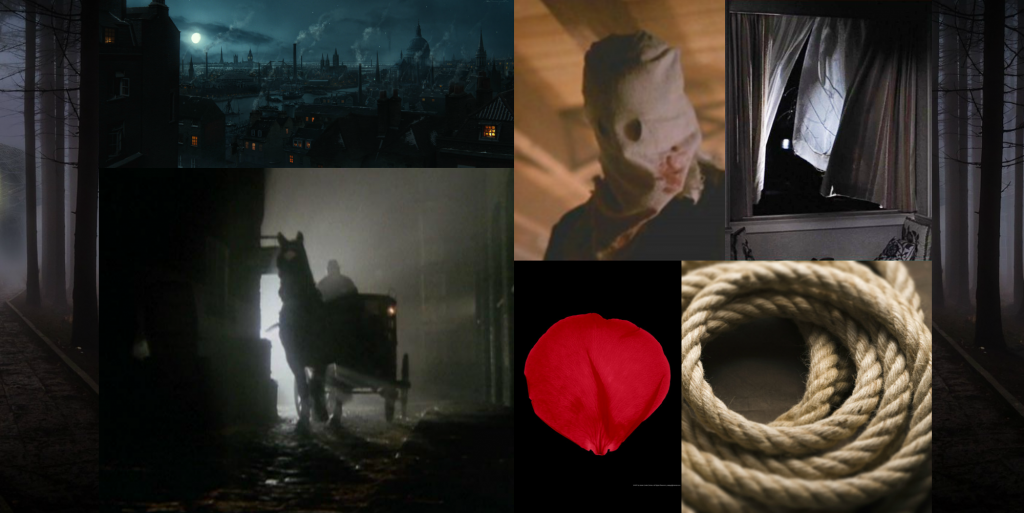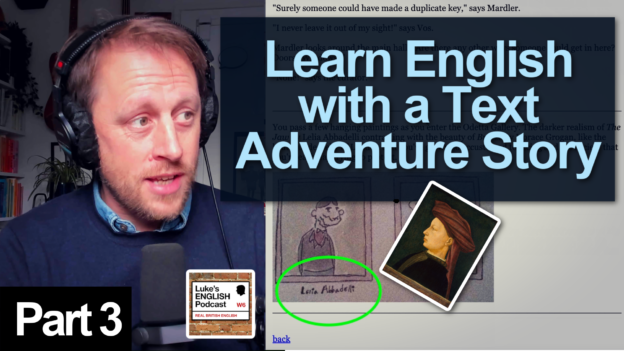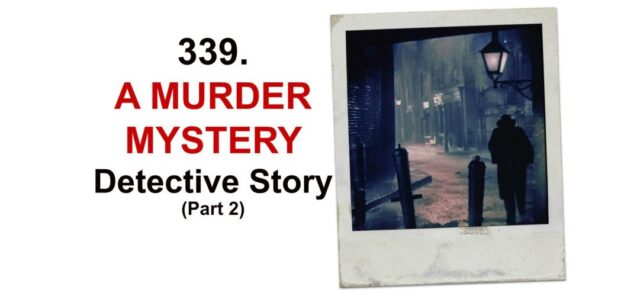Listen to Amber, Paul and me as we attempt to solve a series of mysterious kidnappings in Victorian London.
[DOWNLOAD]
Introduction
Hello everyone, welcome back to the podcast. Here’s a new episode, you’re actually listening to it. It’s really happening and here is my introduction. This was a very fun episode to record and I hope it’s going to be a fun episode to listen to. It’s going to be a two-part episode and this is part 1 and here is the introduction.
Amber & Paul are back on the podcast in this episode, and this time we’re going to play a game in which we imagine that we are detectives trying to solve a mysterious series of kidnappings in Victorian London and you’re going to join us.
In the recording that you’re going to hear, the three of us are reading through an online text adventure game – one of those games where you read part of a story and then make a decision which affects the way the story continues. I have done this on the podcast before. It’s always a fun thing to do so let’s do it again. And the cool thing about this is that the entire text is available online for you to read too. It’s all there if you want to read it, just visit the page for this episode and you can see the link to the game.
Click that link (or just go to textadventures.co.uk and find the story called Victorian Detective 2 by Peter Carlson) and if you check out the text for this story you can then not only listen to this episode but also play the game and read all of the text too.
This opens up lots of possibilities for using this episode to improve your English.
Here are some ways you can do that:
- You just listen to this. Maybe you’re doing the ironing or something. Just listen to us going through the story, try to follow it all, follow our choices and try to enjoy it as an entertaining detective story even if there are some bits that you don’t quite understand. You will hear the entire story from start to finish in this episode and the next one. So, just listen and enjoy it!
- After you listen (like when you get home or whenever you’re in front of a computer) play the text adventure game yourself. That way you’ll get lots of reading done and it’ll be a bit easier to follow the story because you will have already heard us reading through it, it will reinforce the things you heard in this episode, and it’ll allow you to check out words that you didn’t catch by using an online dictionary and so on. Also, as you play the game you can make different choices if you want and you can experience a completely different story.
- You listen and read at the same time, following everything we do, clicking on the same things as us, making the same choices and effectively just reading along with us. You can pause the episode whenever you want if you want to use online dictionaries to check the meanings of any words.
So, there are some options – just listen, or listen then read, or listen and read at the same time.
There’s a bit of graphic violence in this story (blood and stuff…)
Another thing you should know is that this is a crime story and it involves some descriptions of violence and a few gory details. It’s no worse than an episode of a crime thriller on TV or something like that, but there are some descriptions of violence involving blood and mortal danger, so if you’re a bit squeamish, then I suggest that you have a bottle of brandy nearby so you can revive yourself in the typical 19th century fashion, or take a few deep breaths or have a cup of tea to calm your nerves if necessary.
I understand that this episode might be a little difficult to follow
Or maybe not – you might have no problem following it all, but I have a feeling it will be a bit trickier because the three of us get quite animated and excited at times and we speak rather quickly, interrupting each other and talking over each other sometimes, but as we’ve established before on this podcast, that’s actually quite good practice for your listening skills – being able to follow a group conversation. There are many situations like that you could face in the future – imagine for example a business meeting involving you and three other people and everyone’s enthusiastically taking part, sharing ideas, working together quickly to make decisions. It’s good to listen to that sort of thing, rather than just always listening to one person giving a monologue or just two people discussing something. In episodes like this you can get used to hearing multiple voices discussing things and making decisions together.
Try to notice specific language – decision making, verbs of movement and modal verbs for speculation and deduction
From a language point of view, I want you to watch out for this type of language:
Try to notice language for making decisions. Listen out for the ways we ask each other for opinions on each decision, the ways we agree or disagree, the ways we speed things up or slow things down, the way we clarify meaning and the way we summarise or recap information. These things are often done very quickly, yet they’re important practical bits of English for team work.
The story has some moments of action, and so there’s a variety of verbs used to describe different types of movement. Watch out for them and remember to read the text to help you.
Watch out for the language of speculation and deduction. Since we are working together to analyse evidence in order to work out what’s going on, there’s a lot of language of speculation and deduction. So that includes simple ways like, like just putting maybe or perhaps at the beginning of the sentence. For example, “Perhaps she ran away” or “Maybe she was kidnapped”, but also more complex ways using modal verbs to speculate about the past. For example, when you’re talking about possibilities with might or could: “She could have run away” or “She might have been kidnapped” or when you’re certain that something happened by using must, e.g. “She must have escaped through the window” (in the past) and “He must be at the hotel” (in the present), and using ‘can’t’ to talk about something that’s not possible, e.g. “He can’t have escaped through the window, it’s not big enough” or “It can’t be the father!”. So watch out for might have, could have, must have, can’t have for deductions about the past, and watch out for the way we say those auxiliary verbs – “He must have gone through the window” – ‘have’ is hard to hear, but you know it’s there because of the extra syllable and the fact it’s followed by a past participle. “He can’t have done it”.
OK, keep in mind that kind of language, and also the fact that you can read the text for this story too whenever you want, and you’ll see there is a lot to be gained from this episode in terms of English learning.
Just enjoy the story!
But also, I hope you just enjoy listening to the story and spending some more time in the company of Amber, Paul and me.
Alright, that’s enough of an introduction. Here we go!
*** The recording with Amber & Paul starts here ***
Hello Amber & Paul. How are you? … What’s the situation while we record this? … We’re sitting in front of the TV screen and we’re going to play a game.
A Detective Story with Deductive Reasoning
- Have you read any detective stories, or watched Sherlock? (Paul has read the Goosebumps series, Amber has read loads of Sherlock Holmes and Agatha Christie)
- Are you any good at deductive reasoning? Are you good at working things out?
Deductive reasoning: Your deductive reasoning is your ability to recognise certain clues and then put them together to make correct judgements.
Let’s test your deductive reasoning with a quick riddle.
Riddle
Can you answer this cunning Sherlock-style riddle?
There are three light switches in front of you. The light is in an upstairs room and you can’t see it. You are only allowed to take one trip up to the room. How do you work out which switch controls the light?
Answer:
1.Turn two of the switches on, say switch A and switch B. Leave them on for a few minutes. Then turn switch B off. Run upstairs into the room. If the light is on, switch A controls the light. If it is off, feel the bulb. If it is still warm, then switch B controls the light; if it is not warm, then switch C controls the light.
Victorian Detective – Episodes 338 and 339
Last year I did a couple of episodes in which I read through an online text adventure called Victorian Detective on textadventures.co.uk . I read through the story, making decisions based on the evidence, trying to solve a murder mystery. The whole thing was written by a guy called Peter Carlson.
I didn’t ask permission from Peter before reading out the story on the podcast, although I did make a point of giving credit to Peter.
Then, the other day I got an email from Peter Carlson in my inbox. Ooh.
Here’s what it said.
Dear Luke,
I’m the author of the Victorian Detective game, which you read on podcast 338. You did a really good job! Thank you for picking my work to read.
Peter Carlson
I replied:
Hi Peter,
You’re the one who did the great job. Your story was excellent. I hope that it brought a bit more traffic to the site and that more people read your story.
Would you mind if I did Victorian Detective 2 on my podcast as well?
All the best,
Luke
Peter replied:
Thank you, I’m glad you enjoyed the game.
That would be really great if you read Victorian Detective 2 as well.
Peter
I was very pleased to get this endorsement from Peter and he’s clearly quite happy for me to be reading through his stories on the podcast.
Victorian Detective 2
So, let’s do another detective story on the podcast. This one is called Victorian Detective 2 and this time I’m joined by Amber & Paul. Let’s see if we can put our heads together to solve the mystery in this story.
What we’ll do is read through the story as we play it. We can discuss and explain our decisions one by one. The listeners can follow the whole thing and they can even read along with it by going to textadventures.co.uk and finding Victorian Detective 2 – the link is on the page for this episode. That can help you check all the words, the spelling and so on and play the game yourself if you think we are making the wrong choices.
The link: http://textadventures.co.uk/games/view/rl6-r253x0aca-y-v_vnvw/victorian-detective-2
Remember, listeners, that we will be experiencing this story for the first time as we read it, so we have no idea what’s coming next or what happens at the end. In fact, I understand that there are multiple possible endings for this story.
The game will tell us if we’re making good or bad choices along the way. It counts a score as you go. E.g. if you make a good deduction it says “deductive reasoning success” or “deductive reasoning fail” and gives you a + or – score for each decision. And then at the end you get a score which explains what kind of detective you are. E.g. if you’re like Sherlock or you’re Shernot.
OK let’s get started.
We should choose the name of our detective agency.
Thompson, Taylor & Minogue? or Taylor, Thompson & Minogue?
*** The story begins ***
*** End of Part 1 ***
That’s the end of part 1!
Have you managed to keep up with the story so far?
Here’s a brief summary of what has happened so far, just to make it clear.
The story so far
Girls keep getting kidnapped in London. So far 3 girls have gone missing. At the scene of each kidnapping there’s a calling card left by the kidnapper. It’s a creepy smiley face scratched into the floor.
Taylor, Thompson & Minogue (all of us playing the part of one detective with a particular set of skills) are called to the house of the Worthington family, where the daughter Chloe has disappeared. Using our deductive reasoning skills, we work out that she must have run away with her lover – a poor Italian paper seller called Joseph. They planned to run away together but their romantic escape was interrupted violently and unexpectedly when they were attacked at Joseph’s home in a poor part of London. Joseph was hit on the head with a hammer and Chloe was taken away, her body hidden inside a coffin on the back of a carriage. We deduce that the carriage, with Chloe’s body on board must have been taken to a local mortuary by one of the men who works there. There at the mortuary we work out that his name is Cade Brewer, and he’s a kind of creepy loner. Physically he’s huge and strong and he has an appetite for opiate pain killing drugs, woodwork and kidnapping, but we don’t know where he is, so we can’t ask him any questions. Now we have gone back to the police station to consider the situation more carefully.
Four young girls from different social backgrounds have been kidnapped and they all look quite similar – they all have light coloured hair. Then we receive a note from the kidnapper, who calls himself Mr Burlap. The note is written in broken English. It seems that he wants us to find him. He’s playing some kind of sick cat & mouse game. We suspect that Mr Burlap the kidnapper is in fact Cade Brewer, the huge creepy man with the opiate addiction who works at the mortuary. We decide to try and track him down. We first search cemeteries in the area, assuming that Cade Brewer has hidden her in a coffin, but we’re on the wrong track! Our deductive reasoning has failed us. Obviously this is Amber’s fault – just listen back to it and you’ll see, but it also didn’t help when I clicked the wrong option at one point, losing us points and valuable time. Anyway, it turns out Chloe Worthington is not being kept at the cemetery at all. In fact, closer inspection of the evidence shows us that Mr Burlap must be keeping her hostage at an abandoned hospital. So, we decide to go and investigate the hospital. But we’ve just lost precious time by investigating the wrong place, in the cemetery. Have we lost too much time? Will we find the mysterious kidnapper Mr Burlap who wrote us the note in broken English? Will we find Cade Brewer – and is he in fact the kidnapper Mr Burlap as we expect? Will we manage to find Chloe Worthington and the other 3 girls? Will we manage to save them? Or did we waste too much time? What will we discover at the abandoned hospital? And why is Mr Burlap playing such a sick and twisted game?!
I suggest that you immediately check out part 2 (if it’s available) in order to continue this story and to find out if we discover the identity and motives of the kidnapper and how many of the missing girls we manage to rescue.
Thanks again to Peter Carlson. All credit goes to him for writing this exciting detective thriller. Remember you can check out textadventures.co.uk to play more of these games – and there are others written by Peter Carlson.
Any comments? Write something in the comment section below.








